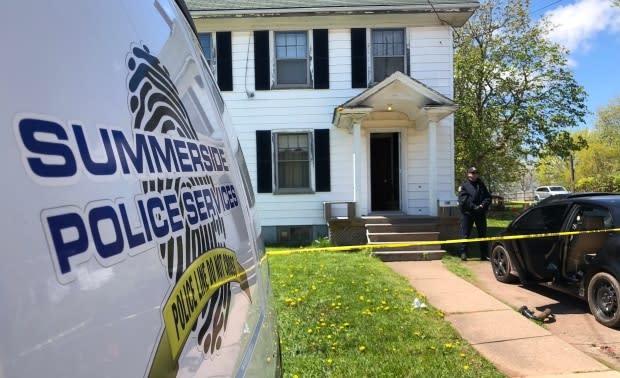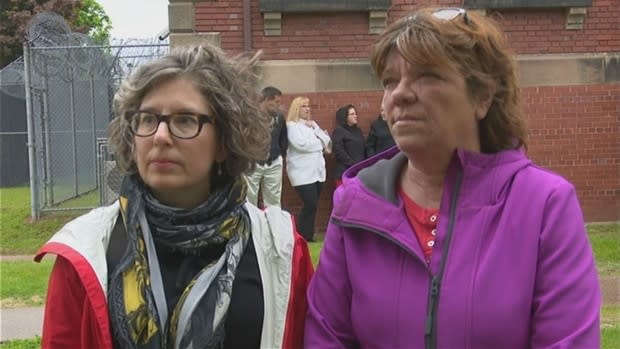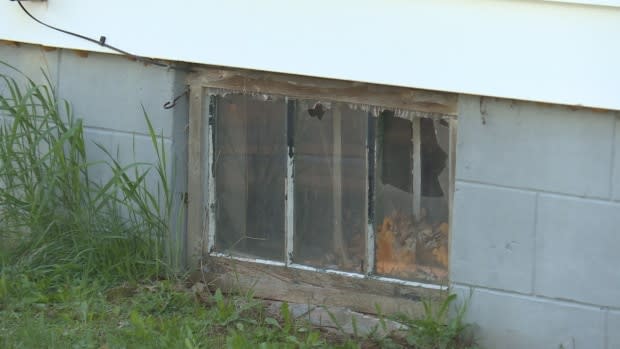Jeremy Stephens' mother sues Summerside police, others for $6M in death of her son
The mother of Jeremy Stephens is suing Summerside police and others for $6 million in the shooting death of her son two years ago.
Documents filed in P.E.I. Supreme Court make allegations of "inappropriate and unjustifiable force" by police officers.
The lawsuit also alleges Summerside police lost all radio call recordings related to the incident, and undermined a third-party criminal investigation into Stephens' death.
None of the allegations in the suit have been proven in court.
Stephens, 32, was shot by police in the basement of a house on Duke Street in Summerside on May 27, 2018. He was a suspect in an altercation and alleged robbery a few hours earlier at a local hotel.
The 28-page lawsuit, filed by Ottawa lawyer Julie Kirkpatrick on behalf of Gilda Stephens and the estate of her son, lays out the family's version of what happened that night.
Among the allegations, the suit claims the police officers had stun guns, but didn't use them.
The suit also suggests the first shot may have been fired by mistake, as three Summerside police officers searched for — and found — Stephens in the dark basement.

"When police commands were first being delivered to Jeremy he did not respond," according to the lawsuit. "At some point Jeremy stood up, agitated, and [the police officer] either bumped into something in the dark, cluttered basement, or tripped backwards and his firearm discharged."
The officer fired two more shots, according to the lawsuit, and another officer in the basement fired six times "until his gun malfunctioned." Stephens was hit by eight bullets, according to the lawsuit.
'Radio communications … missing'
The Serious Incident Response Team (SiRT), based in Halifax, conducted an investigation into how Summerside police handled the matter, and found no basis to lay criminal charges against police.
The SiRT report suggested in the dark basement Stephens threatened an officer with the broken arm of a chair and then a golf club, while not complying with commands.
But the lawsuit alleges the existence of gaps in information provided by Summerside police to the investigators.
The city was in the middle of a planned power outage the night of the incident.
According to the document, Summerside police informed SiRT that all radio-call recording relating to the incident had been lost, "because of the power outage and a failed backup system."
"In particular, all radio communications between the involved officers is missing."

The lawsuit also accuses police of not preparing occurrence reports independently. "Rather, [they] were prepared following internal meetings and discussion at the police station."
And, the lawsuit argues, Summerside police remained in charge of the incident scene on Duke Street for nearly two days, until the arrival of SiRT on May 29.
Planned power outage
According to the lawsuit not all police were carrying flashlights — despite the planned power outage. Neither, allegedly, did they contact the RCMP Emergency Response Team. The lawsuit accuses police of following Stephens into the house illegally, without a search warrant.
Stephens struggled with addiction and mental health issues, and police missed an opportunity to "de-escalate a mental health crisis," according to the suit.
"Many police officers throughout Prince Edward Island knew Jeremy, and understood who he was and what his struggles were," reads the document.
The power outage may also have hampered efforts to save Stephens' life at Prince County Hospital, according to the lawsuit.

After the shooting, police handcuffed Stephens and drove him to Prince County Hospital in the back of a cruiser.
Stephens was "bleeding heavily from his leg and chest" according to the lawsuit, and one officer attempted to tourniquet his leg.
But the hospital "was not ready and the doors were closed," because police "did not provide accurate information to the hospital and minimized Jeremy's injuries," according to the lawsuit.
During the power outage, the hospital's CT scanner had not been plugged into a generator and was not operational, according to the lawsuit. Stephens' first surgery that night was done with "only an ultasound image being available."
"As a consequence, Jeremy could not be stabilized for transport to the Halifax trauma centre," reads the document.
Stephens died in PCH hours later. Health PEI, the hospital and three medical staff are also named as defendants.
Department of Justice
The Stephens' lawsuit says the provincial Department of Justice failed to take a leadership role.
"This state of affairs became extremely problematic," reads the document. "The ministry provided no real direction to SiRT, instead choosing to fully abdicate its responsibility."
The lawsuit paints the actions of police and government as a "catastrophic failure."
"This use of force was applied in circumstances where the defendants … either acted in bad faith, or were wilfully blind as to the risk of death," reads the document.
"The actions of the defendant police officers, in ending Jeremy's life, constituted culpable homicide."
Summerside police and the officers named in the lawsuit, including Chief Dave Poirier, have filed notice in P.E.I. Supreme Court that they intend to defend themselves.
The allegations against them have not been proven. Statements of defence have not yet been filed by any of the defendants.
The suit does not name the minister of justice and public safety, but says government will be notified.
Health PEI says it is aware of the lawsuit. "We empathize with the family and the pain felt in losing a loved one," reads a statement from the agency.
Gilda Stephens is seeking trial by jury in P.E.I. Supreme Court.
More from CBC P.E.I.


